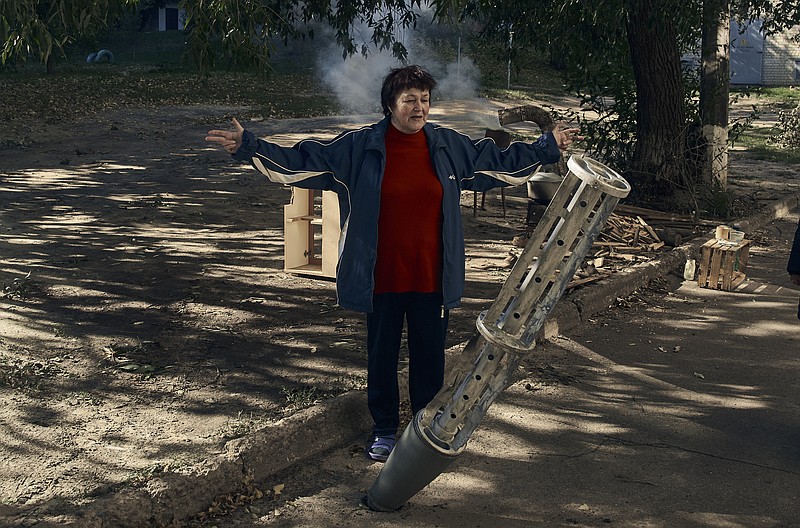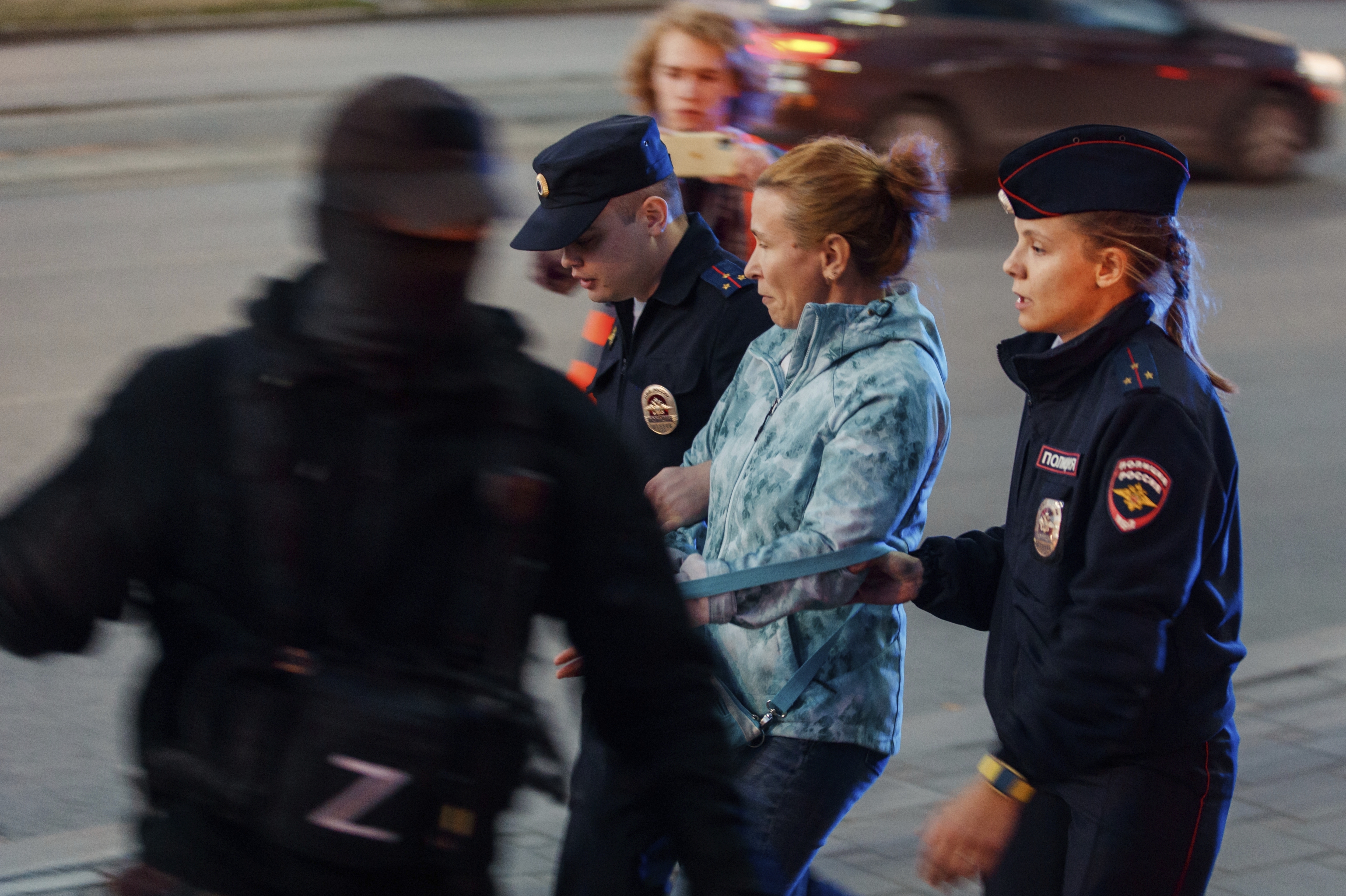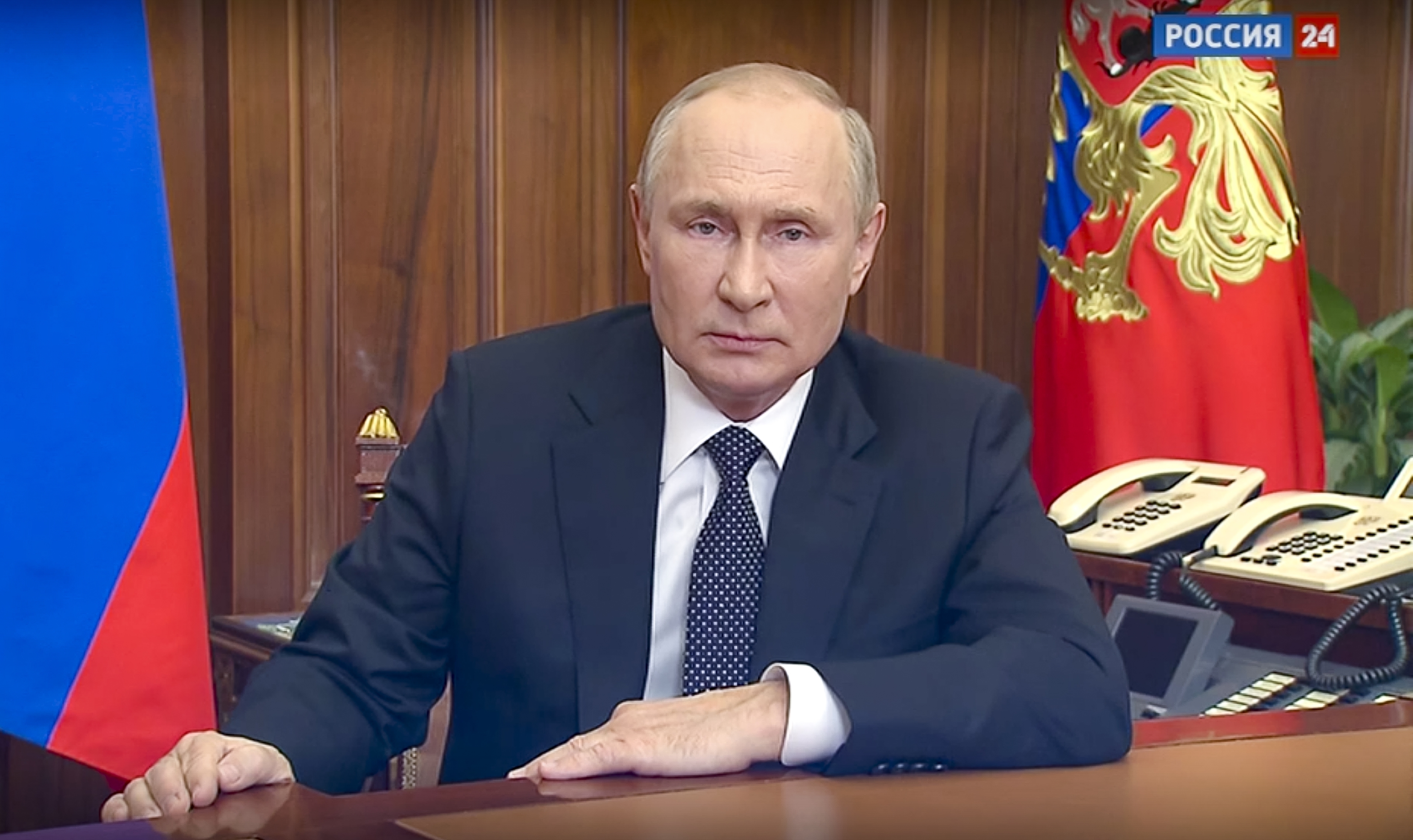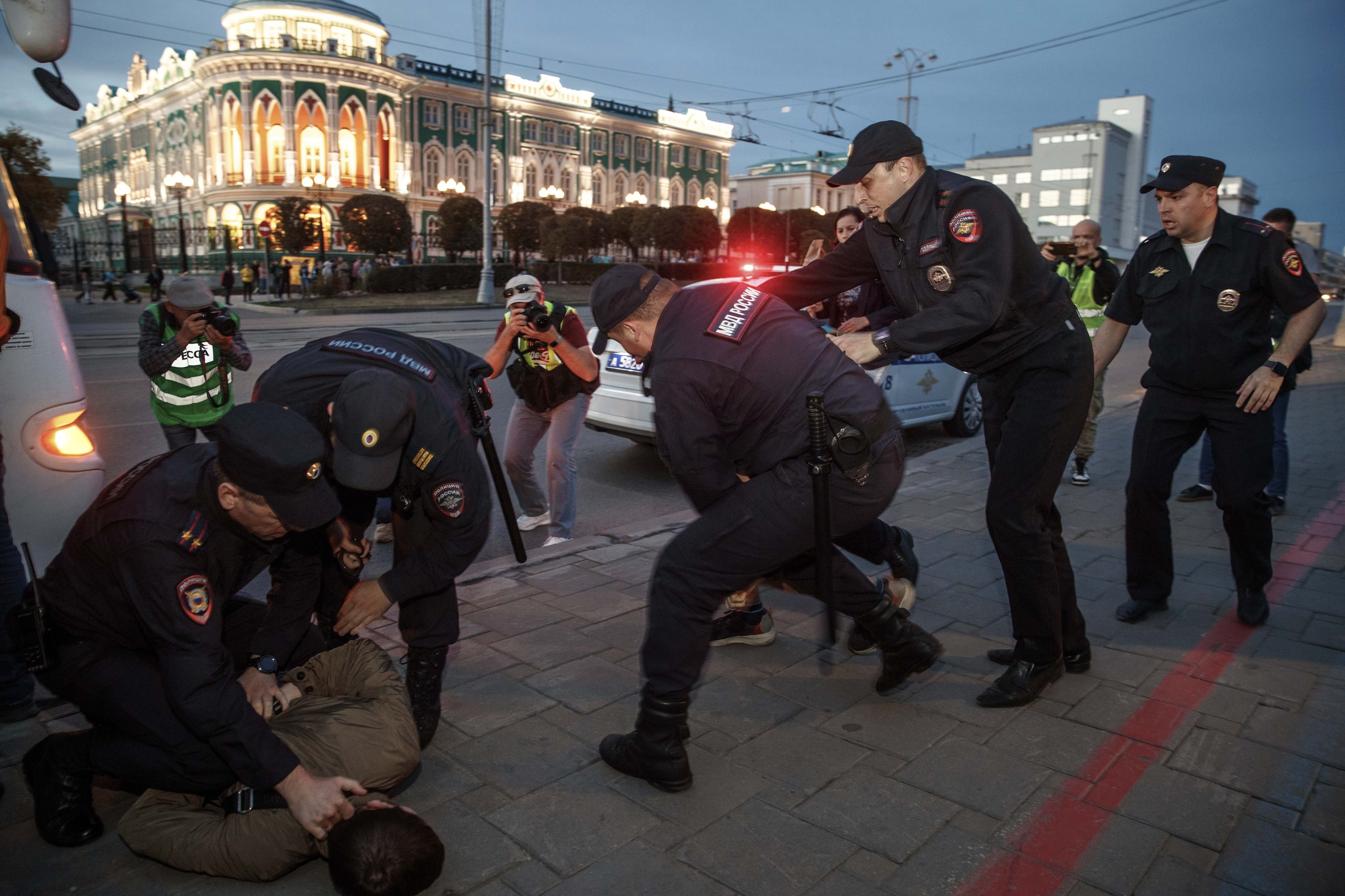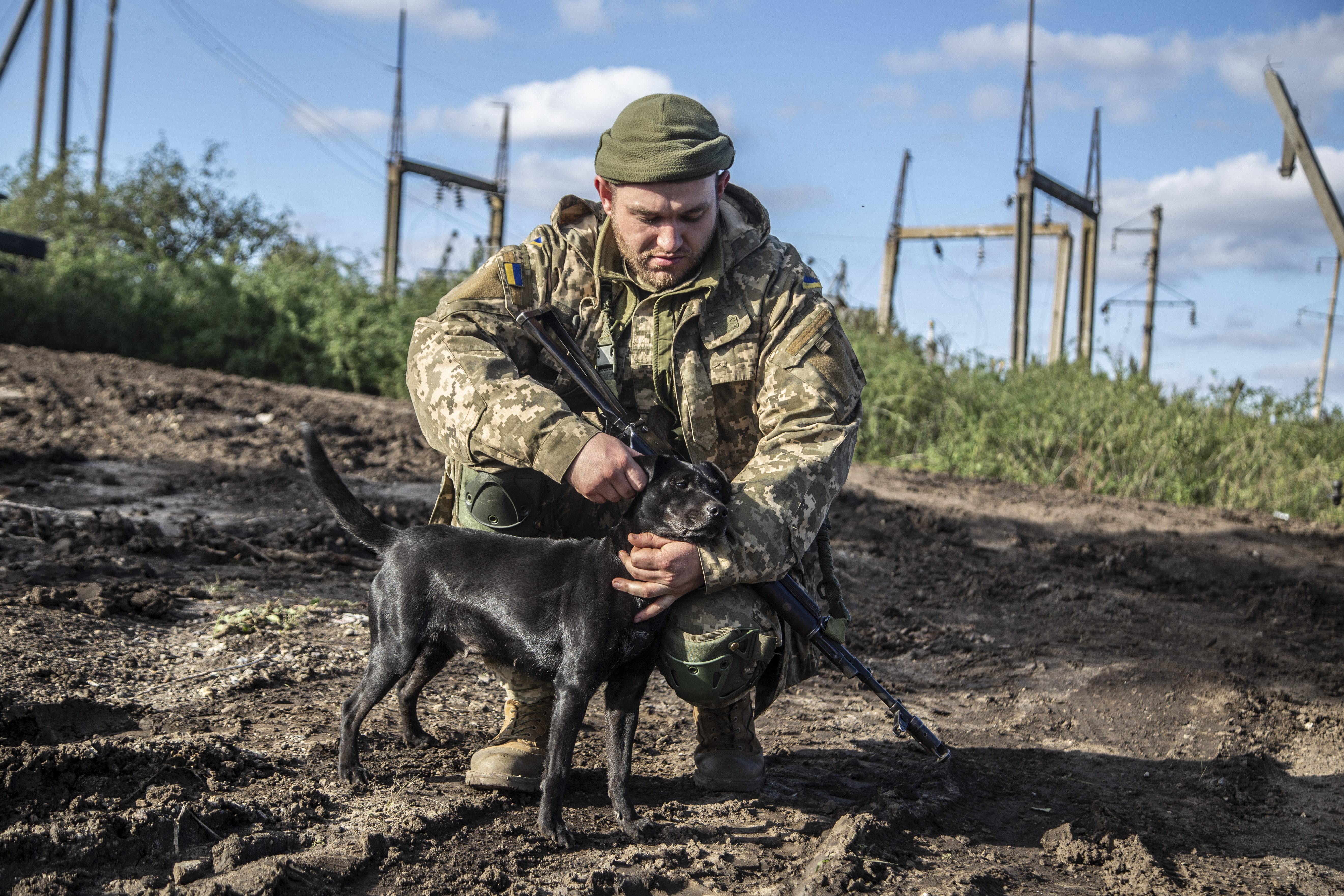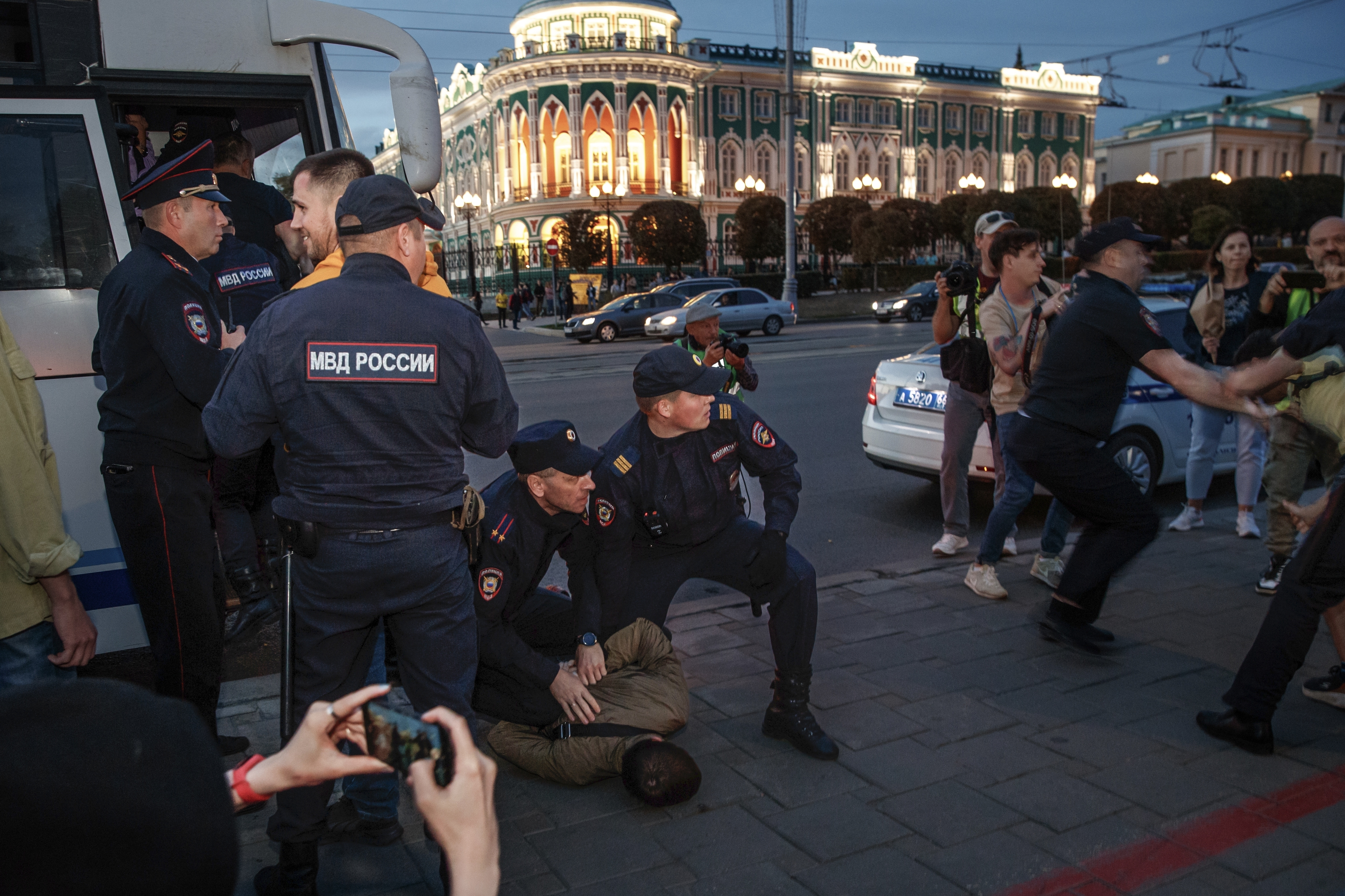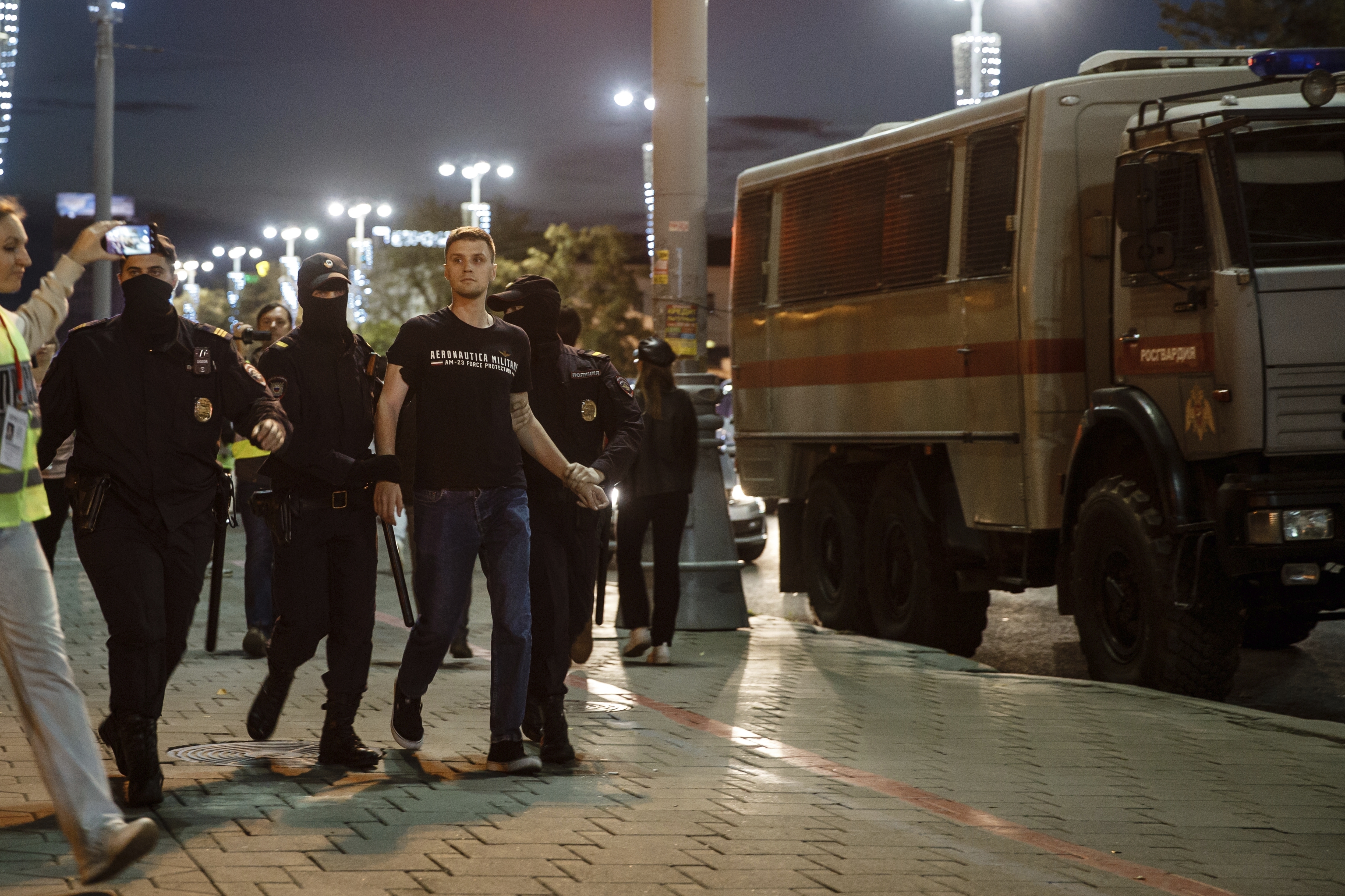KYIV, Ukraine -- Russian President Vladimir Putin ordered a partial mobilization of reservists Wednesday to bolster his forces in Ukraine, a deeply unpopular move that sparked rare protests across the country and led to almost 1,200 arrests.
The risky order follows humiliating setbacks for Putin's troops nearly seven months after they invaded Ukraine. The first such call-up in Russia since World War II heightened tensions with Ukraine's Western backers, who derided it as an act of weakness and desperation.
In his 14-minute nationally televised address, Putin also warned the West that he isn't bluffing about using everything at his disposal to protect Russia -- an apparent reference to his nuclear arsenal. He has previously rebuked NATO countries for supplying weapons to Ukraine.
Confronted with steep battlefield losses, expanding front lines and a conflict that has raged longer than expected, the Kremlin has struggled to replenish its troops in Ukraine, reportedly even resorting to widespread recruitment in prisons.
The total number of reservists to be called up could be as high as 300,000, Russian Defense Minister Sergei Shoigu said. However, Putin's decree authorizing the partial mobilization, which took effect immediately, offered few details, raising suspicions that the draft could be broadened at any moment.
Despite Russia's harsh laws against criticizing the military and the war, protesters upset by the mobilization overcame their fear of arrest to stage protests in cities across the country. Nearly 1,200 Russians were arrested in anti-war demonstrations in cities including Moscow and St. Petersburg, according to the independent Russian human rights group OVD-Info.
Associated Press journalists in Moscow witnessed at least a dozen arrests in the first 15 minutes of a nighttime protest in the capital, with police in heavy body armor tackling demonstrators in front of shops, hauling some away as they chanted, "No to war!"
"I'm not afraid of anything. The most valuable thing that they can take from us is the life of our children. I won't give them [the] life of my child," said one Muscovite, who declined to give her name.
Asked whether protesting would help, she said: "It won't help, but it's my civic duty to express my stance. No to war!"
In Yekaterinburg, Russia's fourth-largest city, police hauled onto buses some of the 40 protesters who were detained at an anti-war rally. One woman in a wheelchair shouted, referring to the Russian president: "G*****n bald-headed 'nut job.' He's going to drop a bomb on us, and we're all still protecting him. I've said enough."
The Vesna opposition movement called for protests, saying: "Thousands of Russian men -- our fathers, brothers and husbands -- will be thrown into the meat grinder of the war. What will they be dying for? What will mothers and children be crying for?"
The Moscow prosecutor's office warned that organizing or participating in protests could lead to up to 15 years in prison. Authorities have issued similar warnings ahead of other protests. Wednesday's were the first nationwide anti-war protests since the fighting began in late February.
In Armenia, Sergey arrived with his 17-year-old son, saying they had prepared for such a scenario. Another Russian, Valery, said his wife's family lives in Kyiv, and mobilization is out of the question for him "just for the moral aspect alone." Both men declined to give their last names.
The state communication watchdog Roskomnadzor warned media that access to their websites would be blocked for transmitting "false information" about the mobilization.
Residents in Ukraine's second-largest city, Kharkiv, appeared despondent about the mobilization as they watched emergency workers clear debris from Russian rocket attacks on two apartment buildings.
"You just don't know what to expect from him," said Kharkiv resident Olena Milevska, 66. "But you do understand that it's something personal for him."
In calling for the mobilization, Putin cited the length of the front line, which he said exceeds more than 620 miles. He also said Russia is effectively fighting the combined military might of Western countries.
Western leaders said the mobilization was in response to Russia's recent battlefield losses.
Russian opposition leader Alexei Navalny said the mobilization means the war "is getting worse, deepening, and Putin is trying to involve as many people as possible. ... It's being done just to let one person keep his grip on personal power."
The partial mobilization order came two days before Russian-controlled regions in eastern and southern Ukraine plan to hold referendums on becoming part of Russia -- a move that could allow Moscow to escalate the war. The votes start Friday in the Luhansk, Kherson and partly Russian-controlled Zaporizhzhia and Donetsk regions.
Michael Kofman, head of Russian studies at the CNA think tank in Washington, said Putin has staked his regime on the war, and that annexation "is a point of no return," as is mobilization "to an extent."
"Partial mobilization affects everybody. And everybody in Russia understands ... that they could be the next wave, and this is only the first wave," Kofman said.
Shoigu, Russia's defense minister, said only some of those with relevant combat and service experience will be mobilized. He said about 25 million people fit that criteria, but only about 1% of them will be mobilized.
It wasn't clear how many years of combat experience or what level of training soldiers must have to be mobilized. Another clause in the decree prevents most professional soldiers from terminating their contracts until after the partial mobilization.
Putin's mobilization gambit could backfire by making the war unpopular at home and hurting his own standing. It also concedes Russia's underlying military shortcomings.
A Ukrainian counteroffensive this month seized the military initiative from Russia and captured large areas in Ukraine from Russian forces.
The Russian mobilization is unlikely to produce any consequences on the battlefield for months because of a lack of training facilities and equipment.
Russian political analyst Dmitry Oreshkin said it seemed "an act of desperation."
"People will evade this mobilization in every possible way, bribe their way out of this mobilization, leave the country," he said.
In other developments, Ukraine announced early Thursday that it had won freedom from Russian custody of 215 Ukrainian and foreign citizens, including fighters who had defended a besieged steel plant in the city of Mariupol for months. Zelenskyy posted a video showing an official briefing him on the freeing of the citizens, in exchange for pro-Russian opposition leader Viktor Medvedchuk and 55 others held by Ukraine.
RUSSIAN FLIGHTS TO FLEE FILL UP
Large numbers of Russians rushed to book one-way tickets out of the country while they still could Wednesday after Russian President Vladimir Putin announced a partial mobilization of military reservists for the war in Ukraine.
Flights filled up quickly and the prices of tickets for remaining connections skyrocketed, apparently driven by fears that Russia's borders could soon close or that Putin could later announce a broader call-up that might send many Russian men of fighting age to the war's front lines.
Tickets for the Moscow-Belgrade flights operated by Air Serbia, the only European carrier besides Turkish Airlines to maintain flights to Russia despite a European Union flight embargo, quickly sold out for the next several days. The price for flights from Moscow to Istanbul or Dubai increased within minutes before jumping again, reaching as high as $9,119 for a one-way economy class fare.
Putin's decree stipulates that the amount of people called to active duty will be determined by the Defense Ministry. Defense Minister Sergei Shoigu said in a televised interview that 300,000 reservists with relevant combat and service experience initially would be mobilized.
Russia has seen a marked exodus of citizens since Putin ordered his troops to invade Ukraine almost seven months ago.
Reports of panic spreading among Russians soon flooded social networks. Anti-war groups said the limited airplane tickets out of Russia reached enormous prices due to high demand and swiftly became unavailable. Social networks in Russian surged with advice on how to avoid the mobilization or leave the country.
Some postings alleged people already had been turned back from Russia's land border with Georgia and that the website of the state Russian railway company had collapsed because too many people were checking for ways out of the country.
A group based in Serbia called Russians, Belarussians, Ukrainians and Serbs Together Against War, tweeted that there were no available flights to Belgrade from Russia until mid-October. Flights to Turkey, Georgia or Armenia also sold out, according to the Belgrade-based group.
"All the Russians who wanted to go to war already went," the group said. "No one else wants to go there!"
One Russian man named Sergey said he had prepared for a Russian mobilization scenario and quickly brought his 17-year-old son out of Russia.
"The tickets didn't cost too much, as I was probably quick enough. And we got through the border just fine," he said upon arriving Wednesday at the airport in the Armenian capital of Yerevan.
His son, Nikolai, said, "I haven't gotten a letter from the recruitment office yet," but he was still researching possible exemptions, "so we left." They declined to give their last names.
Serbia's capital of Belgrade has become a popular destination for Russians during the war. Up to 50,000 Russians have fled to Serbia since Russia invaded Ukraine in February, and many have opened businesses, especially in the IT sector.
Russians don't need visas to enter Serbia, which has not joined Western sanctions against Russia for its aggression in Ukraine. Allies such as Belarus and China also have not imposed sanctions on Russia.
A Wednesday flight from Moscow to Belgrade was packed with young Russian men who said they could not speak to reporters because they feared negative repercussions for the families they left behind. A Russian woman, who identified herself as Yulia, said she, too, was afraid "my government and police" might see her remarks.
"But I want to say, 'Freedom for Ukraine.' Please, somebody stop Putin," she said.
Information for this article was contributed by Karl Ritter, Yesica Fisch, Dusan Stojanovic, Jovana Gec, Dasha Litvinova and Julia Rubin of The Associated Press.
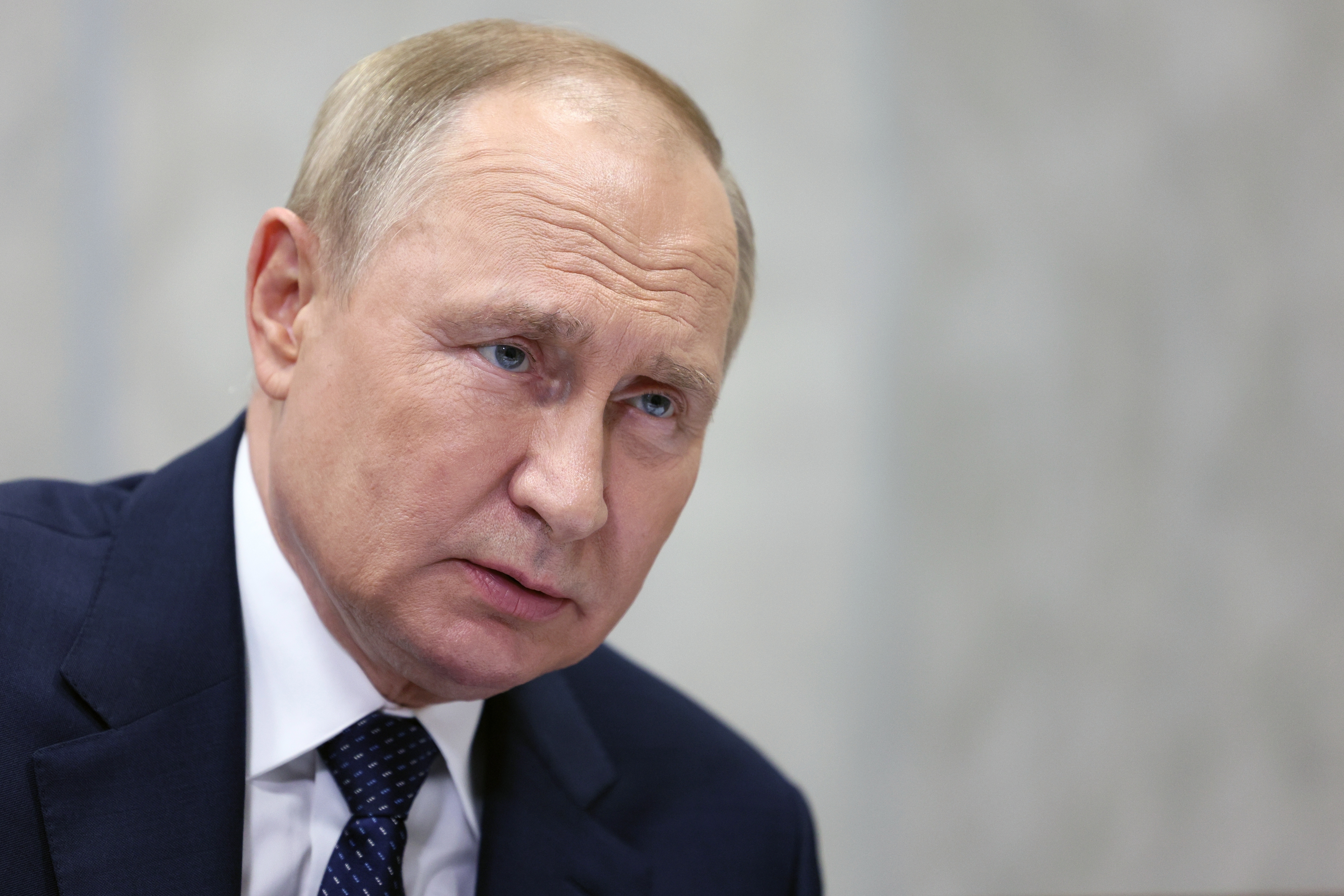 Russian President Vladimir Putin meets with Novgorod Region Governor Andrei Nikitin during his vitit to celebrate the 1160th anniversary of Russian statehood in Veliky Novgorod, Russia, Wednesday, Sept. 21, 2022. Veliky Novgorod is one of the oldest cities in Russia, being first mentioned in the 9th century. (Gavriil Grigorov, Sputnik, Kremlin Pool Photo via AP)
Russian President Vladimir Putin meets with Novgorod Region Governor Andrei Nikitin during his vitit to celebrate the 1160th anniversary of Russian statehood in Veliky Novgorod, Russia, Wednesday, Sept. 21, 2022. Veliky Novgorod is one of the oldest cities in Russia, being first mentioned in the 9th century. (Gavriil Grigorov, Sputnik, Kremlin Pool Photo via AP)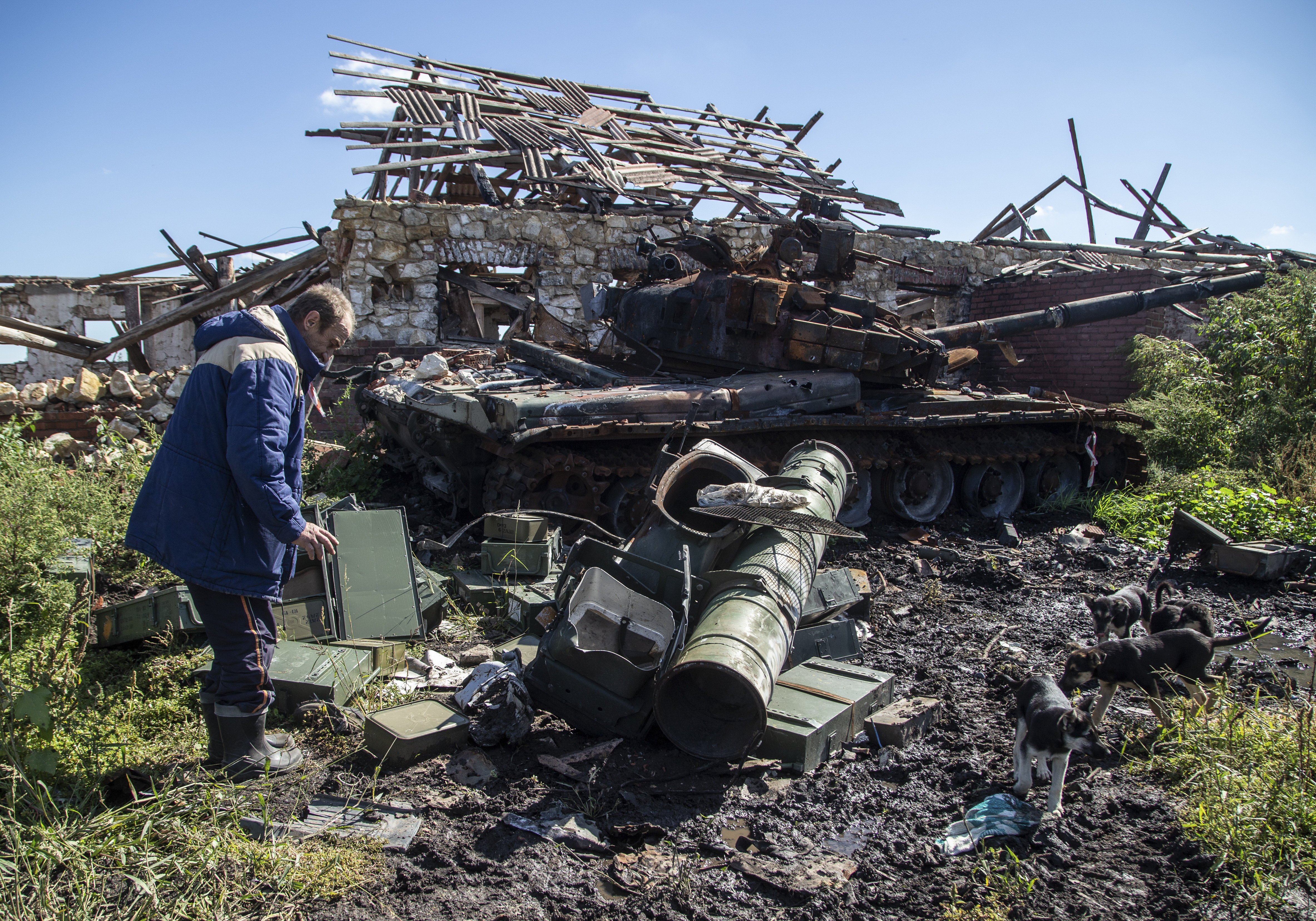 Local resident Oleksandr looks at a damaged Russian tank near his ruined house in the recently retaken area close to Izium, Ukraine, Wednesday, Sept. 21, 2022. Residents of Izium and villages around it recaptured in a recent Ukrainian counteroffensive that swept through the Kharkiv region, are emerging from the confusion and trauma of six months of Russian occupation, the brutality of which gained worldwide attention last week after the discovery of one of the world's largest mass grave sites. (AP Photo/Oleksandr Ratushniak)
Local resident Oleksandr looks at a damaged Russian tank near his ruined house in the recently retaken area close to Izium, Ukraine, Wednesday, Sept. 21, 2022. Residents of Izium and villages around it recaptured in a recent Ukrainian counteroffensive that swept through the Kharkiv region, are emerging from the confusion and trauma of six months of Russian occupation, the brutality of which gained worldwide attention last week after the discovery of one of the world's largest mass grave sites. (AP Photo/Oleksandr Ratushniak)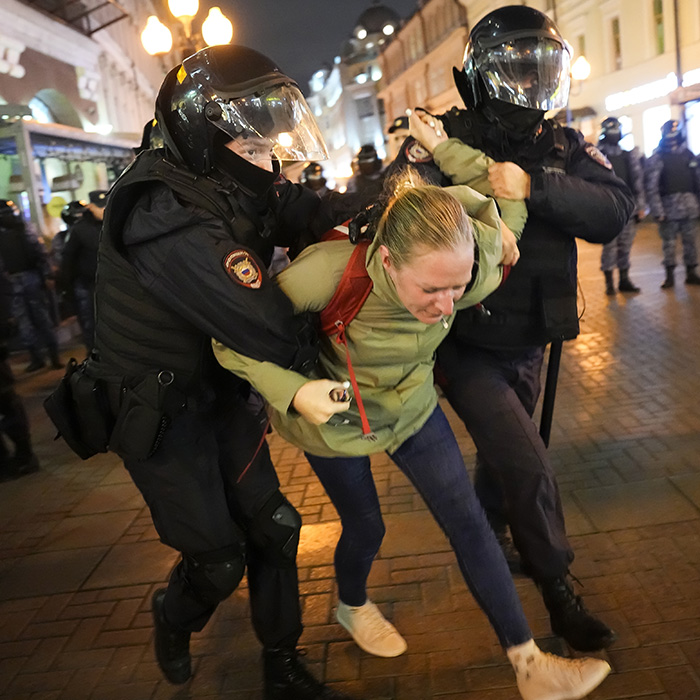 Riot police officers detain a protester Wednesday in Moscow during a demonstration against mobilizing reservists to fight against Ukraine. One analyst said the move by President Vladimir Putin seemed “an act of desperation.” More photos at arkansasonline.com/ukrainemonth7/. (AP/Alexander Zemlianichenko)
Riot police officers detain a protester Wednesday in Moscow during a demonstration against mobilizing reservists to fight against Ukraine. One analyst said the move by President Vladimir Putin seemed “an act of desperation.” More photos at arkansasonline.com/ukrainemonth7/. (AP/Alexander Zemlianichenko)Gallery: Images from Ukraine, month 7
